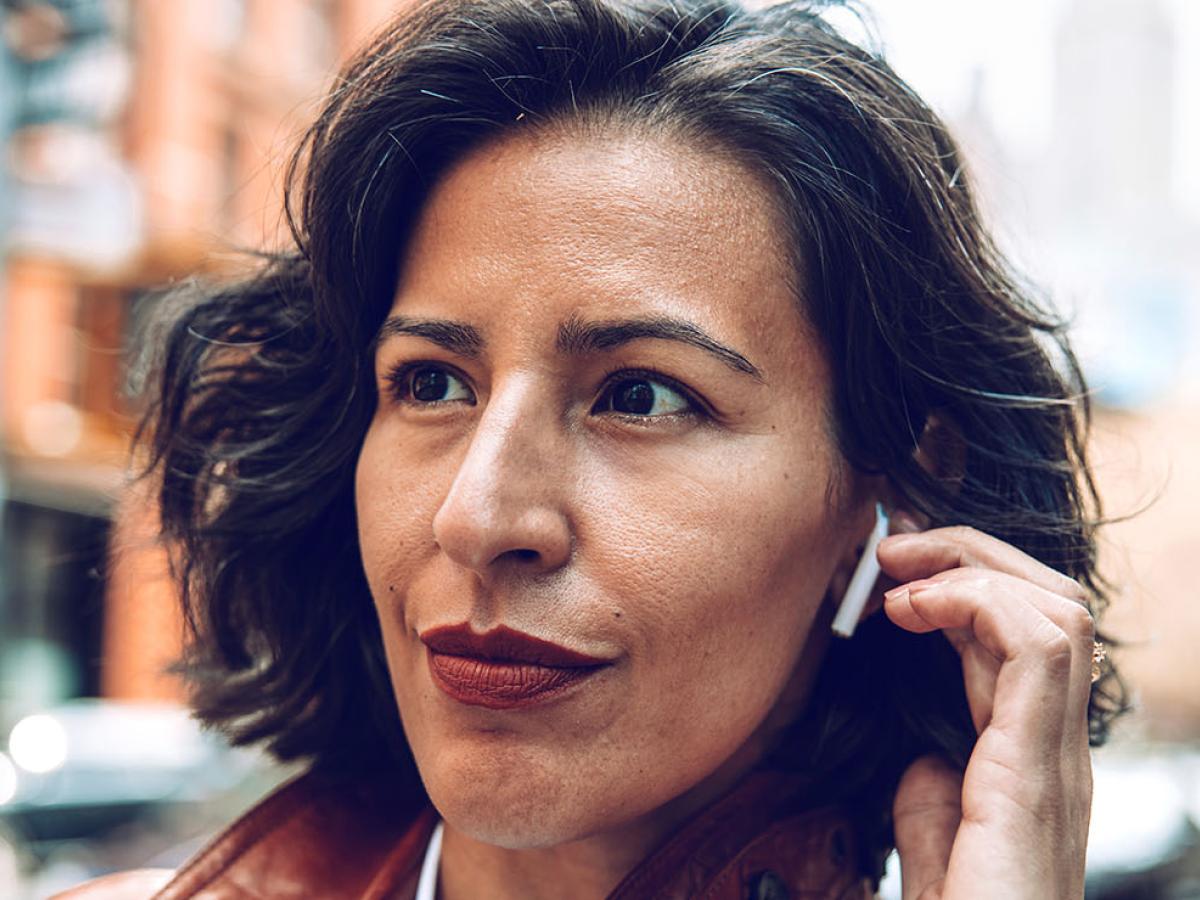February 26, 2025

Hearing loss comes with aging, but it’s typically not something you expect until you’re 60 or older. So why — in your 30s or 40s — are you turning up the television volume or struggling to hear what the waiter is saying?
The truth is that the parts of your ear involved in hearing get tired over time. And they don’t always wait till your 60th birthday to do it.

“As sound hits your ear, it vibrates the eardrum and sends pressure waves into the cochlea where little hair cells react,” explains Dr. Amanda McCarthy, an MU Health Care audiologist (hearing specialist). “Over time, those hair cells get fatigued and die out, causing age-related hearing loss. But genetics and noise exposure can speed up that process.”
Age-related hearing loss (presbycusis) typically becomes noticeable after age 60, and half of adults over 70 have disabling hearing impairments. But you can experience hearing loss much earlier. Recognizing the signs and treating hearing loss is vital, not only to your quality of life but also to your ability to hear later in life.
Dr. McCarthy shares seven things you need to know about early-onset age-related hearing loss:
1. Some People Are More Likely to Lose Their Hearing Early
Most adults won’t struggle with hearing until later in life, but some people are prone to hearing loss earlier. Factors that increase your risk of early hearing impairment include:
- Family history of early-onset hearing loss
- Military service that includes exposure to gunfire
- Regular firearm use, such as hunting
- Sex, as men are almost twice as likely as women to experience hearing loss between the ages of 20 and 69
- Working in a noisy environment, such as a factory or places with heavy machinery
“Exposure to loud environments and family history of hearing loss are the most concerning risk factors,” Dr. McCarthy says. “Find out if you have parents, grandparents, aunts or uncles who had hearing loss that started earlier, because it makes you more likely to have hearing loss before age 60.”
2. Protecting Ears From Noise Can Help Prevent Hearing Loss
Once your hearing is gone, it’s gone. You can’t prevent age-related hearing loss, but you can protect yourself from hearing damage from noise exposure.
“It isn’t just about how loud something is,” Dr. McCarthy says. “It’s also about how long you’re exposed to that noise.” For example, using a loud vacuum occasionally won’t do real damage. But if you clean homes for a living and use a vacuum for hours a day, you may want to protect your ears with plugs or earmuffs.
Dr. McCarthy adds that paying attention to your headphone volume is also important. “If you take them out and your ears are ringing, or you can’t hear people having conversations around you, that’s a sign it’s too loud,” she says. “Just be mindful and turn the volume down a bit to reduce your noise exposure.”
3. It’s Easy (but Not Smart) to Ignore Early Signs of Hearing Loss
The early signs of age-related hearing loss can be subtle and may include:
- Asking people to repeat themselves often (or asking, “Why is everyone always mumbling?”)
- Difficulty hearing with background noise, such as in a restaurant
- Increasing sensitivity to loud sounds
- Needing to turn up the volume on electronics
- Ringing in your ears (tinnitus) that happens enough to be noticeable
“It’s also not uncommon for friends, coworkers and family to notice your hearing loss before you do,” Dr. McCarthy says. “You may not even realize that you are missing out on things you should be hearing.”
While you can certainly live with the early signs of hearing loss, Dr. McCarthy doesn’t recommend it. Letting it go too long could impact other parts of your body’s auditory system — basically, if you don’t use it, you could lose it.
“There’s an auditory nerve that takes sound from your ears to your brain,” Dr. McCarthy says. “If you don’t use it as much as you used to, it can stop functioning well. Even if you choose to get hearing aids later, they may not be successful because your auditory nerve is no longer functioning as it should be.”
Need another reason to get your hearing tested sooner or later? Your adjustment to hearing aids (should you need them) is easier when you can still hear a little on your own.
4. Sudden Hearing Loss May Signal an Underlying Health Issue
Age-related hearing loss tends to be gradual. So, if your hearing seems to get a lot worse overnight, it may not be age-related.
Sudden hearing loss is commonly caused by:
- Ear Infection, which usually also causes other symptoms such as pain, pressure or dizziness
- Impacted wax, which may cause muffled hearing
“If you notice a drastic change in your hearing, get it checked,” Dr. McCarthy says. “That way, we can address any underlying issue quickly.”
In addition to hearing loss, you should also contact your doctor if you notice:
- Dizziness
- Drainage
- Sudden-onset tinnitus (ringing)
- Pain or pressure
5. Untreated Hearing Loss Can Have Health Impacts
Hearing loss can be frustrating. Over time, you may find yourself feeling anxious or avoiding social situations and missing out on connections that are critical for your mental health. Approximately 8% of adults between ages 20 and 69 have depression. But in adults with moderate or worse hearing loss, that number jumps to 18%.
"Mental health is always a concern when people choose not to treat hearing loss,” Dr. McCarthy says. “The effort needed to keep up with a conversation they can’t hear can be too much. So, they choose to isolate and avoid those social environments, which can have many downstream impacts.”
Beyond social isolation and mental health issues, hearing loss can also cause:
- Balance problems because the inner ear, which is affected by hearing loss, also controls balance
- Cognitive issues due to understimulation of your hearing sense
- Trouble with spatial awareness since you cannot determine the location direction of the sounds around you
6. It’s Never Too Early for a Hearing Test
Most people get a baseline hearing test by 60 or between ages 40 and 50 if they are in a high-risk group. But no matter when you have hearing issues, taking a test is never a bad idea.
“Age-related changes in hearing are so gradual that you may not realize how much it changes over the course of a year,” Dr. McCarthy says. “Even if your hearing doesn’t require treatment, the baseline test helps us stay on top of any potential changes.”
7. Treatment for Hearing Loss Can Be Personalized
If you do need help with your hearing, your options may include:
- Amplification tools: These devices and apps help make your phone and electronics louder.
- Over-the-counter (OTC) hearing aids: They help with more mild hearing loss. You won’t need a prescription, but OTC devices can’t be fine-tuned to your individual hearing loss.
- Custom hearing aids: These small devices are worn in or behind the ear and even connect to your phone to make phone calls and listening to music easier.
- Cochlear implants: A surgeon implants these small electronic devices in the inner ear.
If you aren’t ready for hearing aids or live with someone with hearing loss, good communication strategies can also make things easier. Dr. McCarthy says talking slower (not necessarily louder) and facing each other helps.
“Hearing loss, whenever it happens, is a normal part of aging,” Dr. McCarthy says. “Make sure you have patience with yourself and others. And remember that there are specialists who can help.”
Next Steps and Useful Resources
- Struggling to hear like you used to? Learn more about how MU Health Care can help with hearing loss.


